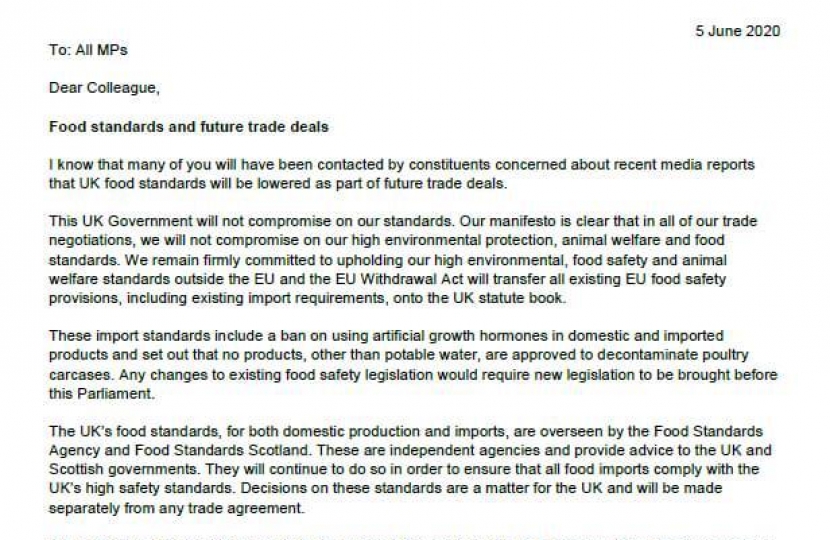
I wanted to update constituents re food standards once we leave EU jurisdiction and the government’s efforts to protect consumers and producers.
It is vital that people across the UK have confidence in the food that they eat, and that our farmers are not penalised for producing at some of the world’s highest food standards. Furthermore, I do not believe that encouraging cheaper imports of food raised in inferior conditions benefits wider animal cruelty concerns. This is why I welcome the government’s very clear commitment that future trade agreements must uphold our country’s high food standards.
Ministers in Department for the Environment, Food and Rural Affairs (Defra) and the Department for International Trade are committed to the success of the UK’s world-leading agriculture sector and see trade policy as a key element in ensuring a positive future for our farmers and growers. They recognise the importance the public attaches to high standards of production, and have been unequivocal that, without exception, these standards will not be adjusted to secure a trade deal. I appreciate there have been significant concerns over goods such as chlorine-washed chicken. I wanted to take this opportunity to share with you the government’s position on similar products and their views on a US-UK trade deal as set out by Victoria Prentis the Parliamentary Under-Secretary for Agriculture, Fisheries and Food;
“I need to reiterate at this point that there can be no question of sacrificing the UK livestock or other farming industries for the US trade deal. To the contrary, it is our view that a US trade deal is perfectly compatible with a thriving UK farming industry and very high standards. We have heard mention of the dreaded chlorine-washed chicken several times, and I would like to reassure the House that under existing regulations, which we will put into English law at the end of this year, chlorine-washed chicken is not allowed, and only a vote of this House can change that.” 13th May 2020
I also have had written assurances this week from both the Secretary of State for International Trade and for the Environment Food and Agriculture that our current food standards, enshrined in EU law, will transfer entirely into UK law. This will mean that water will remain the only allowed liquid to decontaminate chicken and the ban on hormone-induced produce will remain intact. Any changes to these rules would require a change in UK legislation. Furthermore, in the UK the Food Standards Agency will continue to advise the government on food regulation and uphold the highest standards on imports and UK sourced produce. Decisions on these standards will be made separately from any trade agreements, however international trading partners will be aware of what regulations their produce will have to comply with when entering into agreements with the UK.
I am aware that the NFU campaign for a Food Standards Commission has been raised with successive Secretaries of State and I share the concerns for our future import regulations that have resulted in the campaign. I am in constant dialogue with Ministers regarding our future trading relationships and am confident that they have British farming interests at the forefront of their decision making. As I stood up for our local Farmers in jointly securing the grant for dairy farmers, I will stand up for Farmers now. Indeed on the Agriculture Bill, I was a member of the Agriculture Bill Committee and scrutinised the Bill line by line alongside just a handful of other MPs.
I appreciate concerns regarding my vote against the NC2 amendment to the Agriculture Bill. Although I agree we should only be importing high-quality foods, I did not believe it was a necessary or effective measure for protecting food standards and it would have made independent trade deals far more difficult to agree, even with countries who own similarly high food standards as our own. The unintended consequences of this amendment would have potentially had severe repercussions for our ability to export foods and therefore for our farmers.
Firstly, NC2 would infringe on the WTO’s Sanitary and Phytosanitary Agreement, which states that along as standards are “only to the extent necessary to protect human, animal or plant life or health” they “shall not be applied in a manner which would constitute a disguised restriction on international trade.” The amendment would place us in breach of these trade rules and may result in UK farmers not having access to certain foreign markets in the absence of these agreements. Furthermore, I believe it would be almost impossible to compare specific international regulations to determine parity and impractical to investigate these practices.
Furthermore, four public consultations were launched in 2018 providing people with the opportunity to give their views (for example, on food standards) in potential future Free Trade Agreement negotiations with the USA, Australia, New Zealand and on the UK’s consideration of accession to the Comprehensive and Progressive Agreement for Trans-Pacific Partnership. All four consultations collectively attracted over 600,000 responses – making this one of the largest consultation exercises (by volume of responses) run by the UK Government. In any future potential trade agreement that the UK seeks to negotiate, proportionate consultation will be undertaken.
I also support the Food Standards Agency's (FSA) “Regulating Our Future” programme, which seeks to modernise the way that food businesses are regulated, by creating a system that is modern, risk-based, proportionate, robust and resilient. One example of the work which the FSA is currently doing to tackle poor food standards is its campaign against campylobacter, the most common cause of food poisoning in the UK.
A copy of the letter sent to me by Liz Truss and George Eustice is also provided for your reference.

